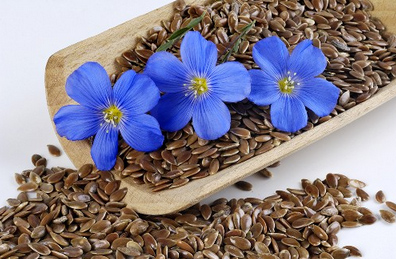 |
|
 |
|
Flax seed nutrition facts Flax seed, also known as linseed, is one of the ancient cultivated crops since Mesopotamian times, grown for its oil seeds, and fiber. The chewy seeds are packed with full of nutrients, omega-3 fatty acids, antioxidants, minerals, and essential vitamins. Off late, nutritional and health benefits of flax have widely drawn the attention of nutrition researchers as well as health enthusiasts alike across the planet.
 FLAX SEEDS WITH FLOWER Flax belongs to the family of Linaceae, of the genus of Linum, and botanically named as Linum usitatissimum.
Flax is one of the easily cultivated crops, flourish well both in tropical and subtropical climates, with its higher production as a field crop noted in fertile river valleys. It is an erect annual plant growing about 1 to 1.5 meters tall and bears light-blue colored attractive flowers.
The fruit pod is a round, dry capsule 6–9 mm diameter, containing several brown or golden-yellow seeds (depending on cultivar type). The seeds feature smooth, glossy surface and flat shape that somewhat appear like sesame seeds, but quite larger, measuring about 5–7 mm in length.
In general, there exist two common cultivars of flax; one is predominantly grown for its oil seeds and the other variety for fiber. Seed flax generally features brown, and yellow or golden-yellow color seeds, with most types having similar nutritional values and equal amounts of short-chain omega-3 fatty acids.
Health benefits of Flax seed
As in other oil seeds, flax too is one of the very high-calorie foods. 100 g of seeds contain 534 calories or 27% of daily-required levels. Further, the seeds are an excellent source of numerous health-benefiting nutrients, dietary fiber, minerals, antioxidants and vitamins that are essential for optimum health.
Flax seed is rich in monounsaturated fatty acids like oleic acid. It is also one of the top vegetable sources of omega-3 essential fatty acids such as linoleic acid, alpha-linolenic acid (ALA) and arachidonic acids. Regular intake of small portions of flax seeds in the diet helps to lower total as well as LDL or “bad cholesterol” and increases HDL or “good cholesterol” levels in the blood. Research studies suggest that Mediterranean diet that is rich in fiber, monounsaturated fatty acids and omega-3 fatty acids help to prevent coronary artery disease and strokes by favoring healthy blood lipid profile.
Flax seeds are perhaps one of the most widely available botanical sources of n-3 or ? (omega)-3 fatty acids. Flax seed oil consists of approximately 55% ALA (a-linolenic acid). One spoonful of flax seed oil provides about 8 g of omega-3 fatty acids. Research studies have suggested that n-3 fatty acids by their virtue of anti-inflammatory action help lower the risk of blood pressure, coronary artery disease, strokes and breast, colon and prostate cancers. Adequate quantities of n-3 oils are required for normal infant development and maturation of nervous system.
The seeds contain lignans, a class of phytoestrogens considered to have antioxidant and cancer preventing properties.
Flax are an excellent source of vitamin E, especially rich in gamma-tocopherol; containing about 20 g (133% of daily-recommended values) per 100 g. vitamin E is a powerful lipid soluble antioxidant, required for maintaining the integrity of cell membrane of mucus membranes and skin by protecting it from harmful oxygen-free radicals.
The seeds are packed with many important B-complex groups of vitamins such as riboflavin, niacin, thiamin, pantothenic acid, vitamin B-6, and folates. Thiamin is an essential co-factor for carbohydrate metabolism and helps prevent beri-beri disease. Folates help prevent neural tube defects in the fetus when consumed during pre-conception period and pregnancy.
Furthermore, flax seed is rich source of minerals like manganese, potassium, calcium, iron, magnesium, zinc and selenium.
Flax or linseed oil has flavorful nutty aroma and has been used in cooking, and as “carrier" or "base oil” in traditional medicines and in pharmaceutical uses.
Selection and storage
Flax seeds are available in the market year around. In the stores, one may come across different forms of flax such as whole dry seeds, roasted, ground, etc. Attempt to buy whole, golden-yellow flax seeds instead of ground (powder) as it ensures that the seeds are intact in nutrients, unadulterated and have a longer shelf life.
There are two varieties of flax seeds; brown and yellow or golden, with most types having similar nutritional values and almost same amounts of short-chain omega-3 fatty acids. The seeds should feature bright, brown or golden-yellow (depending on the variety) color, smooth, compact, and uniform in size and feel heavy in hand. They are generally available in the airtight packs as well as in bulk bins.
Whole seeds may be placed in cool dry place for many months, while the ground form should be placed inside airtight container and kept in the refrigerator to avoid them turn rancid. See Also Health Benefits of Watermelon Seeds, 8 ways to a healthy blood pressure, ways to control high blood pressure without medication, ARJUNA A HEART SAVING TREE, Flax seed nutrition facts, Cashew nut nutrition facts, Health Benefits of Brown Rice, Aloe Vera Juice The New Miracle Drink, Super Health Benefits of Sesame Seeds, Home Remedies for High Blood Pressure, 10 ways to control high blood pressure without medication, Almonds nutrition facts, Health benefits of Walnuts, Health benefits of black pepper, Surprising Health Benefits of Cinnamon, Explore the health benefits of garlic, Health Benefits of Drinking Green Tea, Amazing Health Benefits of ginger, Health Benefits of Turmeric, Best Fruits for Losing Weight, Eating Regularly To Lose Weight, Benefits of Clove in our day to day life, Health Benefits of Neem, Benefits of the Holy Basil (Tulsi), Health Benefit of red Chillies, Healthy Diet Habits, The healthiest way to lose weight , 10 Benefits to Drinking Warm Lemon Water Every Morning, Health Benefits of Apricot, Benefits of Honey in Weight Loss, Health Benefits of Indian Gooseberry or Amla, |
|
|
|
|
|
|
|
All Rights Reserved. Indyabiz.com







